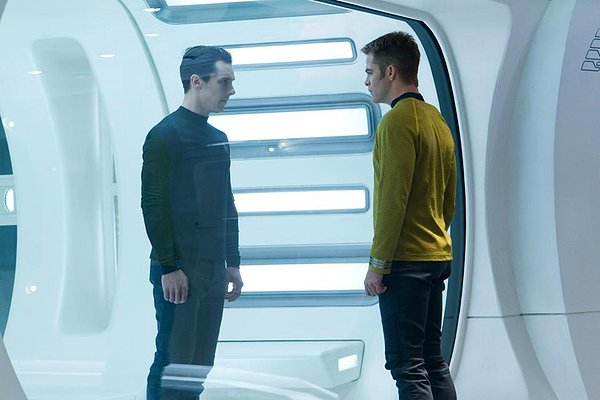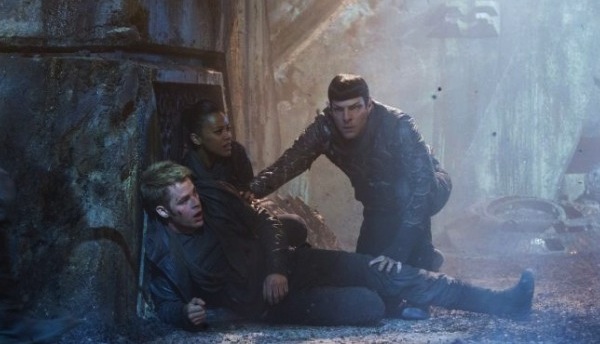Star Trek Into Darkness Review
Having inherited the keys to “Star Wars,” J.J Abrams has seen a rash of outbursts from skeptics in the last few months, picking up steam with this, the release of his second adventure with the crew of the U.S.S. Enterprise. Surely one man cannot control both nerd worlds, right? Well, “Star Trek Into Darkness” offers more proof why everyone should just let him try.
Abrams has an acute understanding of creating universally enjoyable entertainment not really seen since Steven Spielberg in his heyday. His use of mystery as a tool to pull viewers in creates the sensation of a two-hour thrill ride, which is essentially what we get with “Into Darkness.”
Equal credit goes –of course—to his team, especially writers Roberto Orci, Alex Kurtzman and Damon Lindelof, who each add yet another shining bullet point to their respective resumes. Much of the formula that made the initial “Star Trek” reboot a success gets implemented in this script. The pace of the film never lags, delivering persistent action, suspense, mystery or some combination of the three, stopping only for character-developing moments (and usually ending them with a sudden bang). The ace in the hole—and what makes “Into Darkness” a better film by a slim margin—is Benedict Cumberbatch as the villain.
If you’re familiar at all with Cumberbatch’s work, particularly in the title role on BBC’s “Sherlock,” you knew that at some point he would play a significant villain and absolutely nail it. Fortunately for “Star Trek” fans, Abrams got the first chance to unleash Cumberbatch on a mass-scale audience. His role allows him to be the perfect combination of a formidable physical and mental threat, and the script has you clawing for the truth from the onset that it only magnifies Cumberbatch’s strengths. Eric Bana’s Nero in the previous film pales in comparison.
“Into Darkness” continues much of the focus of the earlier film, adding complexity to James Kirk’s (Chris Pine) gutsy and arguably reckless decisionmaking, Spock’s (Zachary Quinto) inability to feel emotions and the friendship between the two. After the opening scene mission on the planet Nibiru in which Kirk violates Starfleet directives to save Spock, Kirk loses to the Enterprise back to its former captain Pike (Bruce Greenwood), but his probation doesn’t last long when Starfleet’s own, John Harrison, (Cumberbatch) blows a Starfleet archive in London and essentially declares war with the federation. Running at the chance to catch Harrison, Kirk plunges the Enterprise and its crew right into the middle of a deadly no-win scenario.
There’s a lot of who’s really the bad guy manipulation/mind games on the script’s part that doesn’t exactly fit together nicely all the time in terms of what’s really going on, but the level of danger and urgency never fades and that makes “Into Darkness” an ideal blockbuster. Once again, Abrams and co. aren’t afraid to pick up the Enterprise like a hyper toddler and shake and smash it and its crew until there seems to be no hope (except for that perfect window to save the day that was set up by some earlier occurrence in the movie).
As Abrams has said multiple times in interviews, he was never a fan of “Star Trek” growing up, so he aimed to make these films accessible to a wider audience. “Into Darkness” definitely is, with plenty of goodies for fans of varying degrees. A sequence on the Klingon home world of Kronos satisfies the hard sci-fi and “Trek” fans’ curiosity about the extent of Abrams’ take on this universe, while also teasing its potential. You’re going to want more Klingons after this film.
Right there is what ought to give “Star Wars” fans some confidence in Abrams: the curiosity factor, the scratching at the surface of the lore that attracts a geek following and appeasing it, while at the same time still delivering a focused, entertaining film that emphasizes the importance of the characters. The biggest problem with the “Star Wars” prequels as compared to the original trilogy is the poor quality of the characters and relationships. Just restoring that element to the mix guarantees a certain measure of success with the new “Star Wars” films.
“Star Trek” is in a really good place after “Into Darkness.” The first two films work together in terms of the character relationships and themes, and while there will always be room to test the bounds of Kirk and Spock’s friendship, to use an example, the door has been opened for the Enterprise to explore anything and everything Gene Roddenberry’s rich universe has to offer.
4.5/5 Stars
Star Trek Into Darkness
Directe by J.J. Abrams
Written by Alex Kurtzman, Roberto Orci and Damon Lindelof
Starring: Chris Pine, Zachary Quinto, Benedict Cumberbatch, Zoe Saldana







0 Comments
You can be the first one to leave a comment.